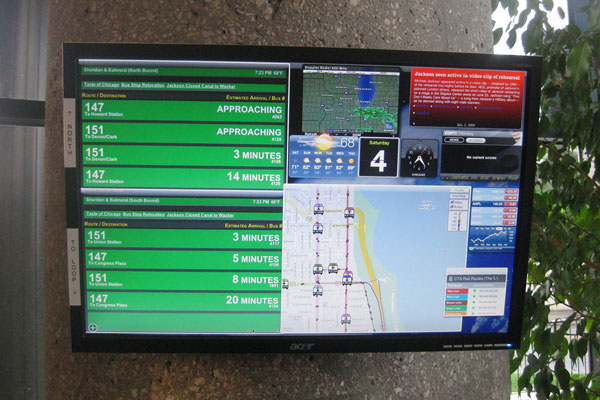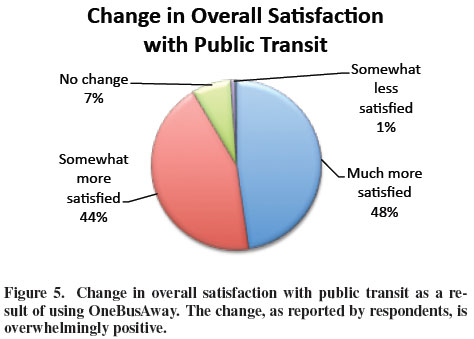
I live between the Chicago and Grand bus lines, so CTA's bus tracker has been a real boon for me. If a 65 is coming in around six minutes, I can almost certainly catch it. If not, I can do the calculations in my head to see if the 66 will be more efficient. About once a week, it allows me to shave ten or 15 minutes off a one-way commute. Sometimes it allows me to stay inside for a few minutes longer, a nice benefit if the weather is bad, or to give a more accurate time of arrival—no small matter, since I'm usually running late.
But normally it's just a few minutes here or there, and I find myself doing what I'd normally do in the absence of Bus Tracker. So, in a strapped city that's hiking fees and cutting library hours, I can't help but wonder if it's worth the convenience, which often just means knowing when the bus I have to take is coming.
Thanks to Steven Vance, one of my favorite local bloggers, I got to read a study out of the University of Washington [PDF] about what Seattleites think of their bus-tracking system, and why. They like them. A lot:

Why? A few reasons. Among them:
We asked users how their perception of personal safety had changed as result of using OneBusAway. While 79% of respondents reported no change, 18% reported feeling somewhat safer and 3% reported feeling much safer. This increase in the perception of safety when using OneBusAway is significant overall (X2 = 98.05, p < 10−15). We also found that safety was correlated with gender (X2 = 19.458, p = 0.001), with greater increases for women.
This hadn't really occurred to me, but 1) I'm a guy and 2) since Bus Tracker debuted I've been living and working in low-crime areas, which was not always the case. But I wasn't surprised at the most common response:
To get a better picture of user satisfaction with public transit with regards to OneBusAway, we asked respondents to describe how their satisfaction had changed in a free-form comment. We had 418 responses, which fell into a small number of key categories. The most common response, mentioned by 38% of respondents, concerned how OneBusAway alleviated the uncertainty and frustration of not knowing when a bus is really going to arrive.
Bingo: perception! A little while ago I wrote about how congestion screws with our perception of commuting satisfaction: a longer, uncongested commute can be much more frustrating than a shorter, more congested, stop-and-start commute. Nonetheless, I'll never cease being surprised at how powerful it is, and the potential public policy implications. And there are more straighforward ones as well:
With headway-based service, supervisors use real time transit data to maintain a certain amount of time between buses, rather than attempting to maintain a schedule, thereby allowing free running time and saving slack time.
Translated: if you train people to rely on bus trackers instead of schedules, buses don't have to be at certain stops at certain times, so they can run more efficiently.
Vance has much more on the study, and a complimentary post at Grid Chicago with some excellent suggestions to improve Bus Tracker—in particular, letting users know when the last bus on a route is running, which I know from experience would make a huge difference for Hyde Park residents.
Photograph: jbracken (CC by 2.0)



